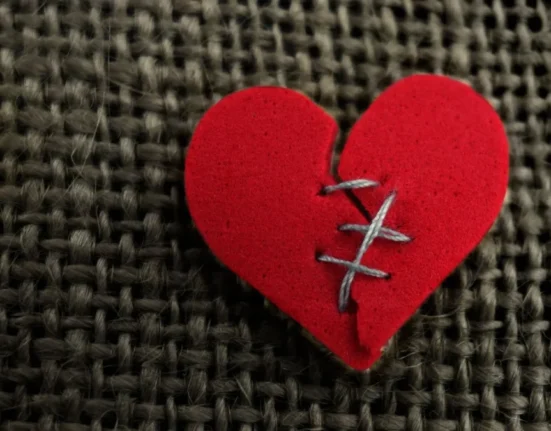Last Updated on February 6, 2025 by Rachel Hall
Most relationships do not break down suddenly. Instead, they unravel gradually due to emotional neglect, unresolved conflict, and a lack of connection. The challenge is that many couples fail to recognise the warning signs early.
If you recognise patterns of emotional disconnection, repeated criticism, or a growing feeling of loneliness, it may be time to evaluate your relationship. Here are seven hidden red flags that could indicate your relationship is at risk, along with expert insight on navigating these challenges effectively.
- 1. Walking on Emotional Eggshells: A Major Relationship Red Flag
- 2. A Sudden Increase in Physical Intimacy: Disconnection in Disguise?
- 3. A Shift from "We" to "I": Four Clear Signs of Emotional Distance
- 4. Avoiding Long-Term Commitments: A Destructive Sign of Relationship Trouble
- 5. Constant Criticism and Defensiveness: A Toxic Relationship Pattern
- 6. Manipulation and Control: A Serious Relationship Red Flag
- 7. Increasing Loneliness: Feeling Alone in a Relationship
- Final Thoughts: Recognising Hidden Signs Before It’s Too Late
1. Walking on Emotional Eggshells: A Major Relationship Red Flag
A healthy relationship should provide emotional support, security, and a sense of ease. If you find yourself constantly second-guessing your words or actions to avoid an argument, this is a clear sign of fear of conflict. When one partner is unable to express their true thoughts due to fear of criticism or defensiveness, the relationship begins to suffer.
Signs You’re Walking on Emotional Eggshells
- You suppress your thoughts and emotions, fearing they will upset your partner.
- Conversations feel strained, with tension dominating your interactions.
- You apologise excessively, even when you have done nothing wrong.
- Your partner may react with criticism or defensiveness whenever issues are raised.
How to Navigate This Emotional Challenge
- Recognise the problem and prioritise open communication.
- Set healthy boundaries by discussing expectations and emotional needs.
- If fear of upsetting your partner is preventing honest discussions, seeking professional help may be necessary.
2. A Sudden Increase in Physical Intimacy: Disconnection in Disguise?
A sudden rise in intimacy might seem positive, but it can sometimes be a means of masking deeper relationship issues. When physical affection is used to avoid addressing underlying conflict or emotional disconnection, it can be a deceptive sign that a relationship is struggling.
Indicators of Unhealthy Intimacy Changes
- Physical affection becomes more frequent, but emotional support remains absent.
- Your partner initiates intimacy after an argument instead of discussing the issue.
- There is a reluctance to engage in deep, meaningful conversation.
How to Resolve This Relationship Issue
- Ensure that intimacy is accompanied by emotional connection.
- Openly discuss any underlying issues rather than using physical closeness as a distraction.
- If the relationship feels emotionally unbalanced, consider consulting a therapist.
3. A Shift from “We” to “I”: Four Clear Signs of Emotional Distance
A strong relationship thrives on a shared vision for the future. When a partner shifts from we to I in conversations, it can indicate emotional disconnection and a lack of attachment.
Recognising Emotional Detachment
- Your partner no longer includes you in plans.
- There is a shift in conversations from mutual goals to personal aspirations.
- They avoid discussing long-term commitments or shared ambitions.
How to Reconnect with Your Partner
- Recognise this shift and initiate a genuine conversation about your future together.
- Express your concerns and ask for clarity on where the relationship is heading.
- If your partner continues to show reluctance, it may be time to determine whether the relationship is still serving both of you.
4. Avoiding Long-Term Commitments: A Destructive Sign of Relationship Trouble
If your partner begins avoiding discussions about the future, it may indicate uncertainty about the relationship. A reluctance to commit to plans can be a sign that they are considering whether to leave the relationship.
Signs of Commitment Avoidance
- Resistance to discussing marriage, moving in together, or shared financial planning.
- Frequent dismissal of conversations about future aspirations.
- A growing tendency to make decisions independently rather than as a couple.
How to Navigate This Relationship Red Flag
- Have a direct conversation about your expectations.
- Recognise whether the avoidance is a temporary phase or a constant pattern.
- If commitment concerns persist, seeking guidance from a professional can be beneficial.
5. Constant Criticism and Defensiveness: A Toxic Relationship Pattern
Frequent criticism and defensiveness can create a destructive cycle that erodes trust and emotional security. A relationship built on negativity and blame is unlikely to thrive.
Recognising the Criticism-Defensiveness Cycle
- Your partner frequently points out your flaws rather than appreciating your strengths.
- Simple disagreements escalate into personal attacks.
- You feel emotionally drained after every interaction.
How to Resolve This Issue
- Shift focus from criticism to constructive discussions.
- Prioritise using positive language to communicate concerns.
- If negativity dominates the relationship, consider seeking professional help.
6. Manipulation and Control: A Serious Relationship Red Flag
Manipulation in a relationship often goes unnoticed until it becomes deeply ingrained. Whether it manifests as guilt-tripping, gaslighting, or emotional blackmail, controlling behaviour is a serious sign of an unhealthy relationship.
How to Identify Manipulation in a Relationship
- Your partner makes you feel guilty for setting boundaries.
- Conversations are frequently twisted to make you feel like the victim.
- You feel isolated from friends and family.
How to Handle a Manipulative Partner
- Recognise manipulation tactics and assertively set boundaries.
- Seek guidance from a therapist or support network.
- If the relationship becomes abusive, prioritise your well-being and consider how to leave the relationship safely.
7. Increasing Loneliness: Feeling Alone in a Relationship
Feeling lonely in a relationship is a strong indicator of emotional disconnection. When one partner feels unheard or undervalued, attachment weakens, and the relationship begins to suffer.
Signs of Relationship Loneliness
- You feel more alone with your partner than when you are by yourself.
- Conversations are superficial and lack depth.
- There is little to no physical or emotional support.
How to Rebuild Emotional Connection
- Prioritise quality time together and meaningful conversation.
- Express your emotional needs and listen to your partner.
- If the loneliness persists, consider whether to leave the relationship.
Final Thoughts: Recognising Hidden Signs Before It’s Too Late
Relationships require emotional intelligence, communication, and a commitment to work together through challenges. Recognising these red flags early can help you navigate difficulties and make informed decisions about your relationship.
If these signs feel familiar, take action—whether that means having a difficult conversation, seeking professional help, or making the tough decision to end a relationship that no longer serves you.

Rachel Hall, M.A., completed her education in English at the University of Pennsylvania and received her master’s degree in family therapy from Northern Washington University. She has been actively involved in the treatment of anxiety disorders, depression, OCD, and coping with life changes and traumatic events for both families and individual clients for over a decade. Her areas of expertise include narrative therapy, cognitive behavioral therapy, and therapy for traumatic cases. In addition, Rachel conducts workshops focusing on the psychology of positive thinking and coping skills for both parents and teens. She has also authored numerous articles on the topics of mental health, stress, family dynamics and parenting.








Leave feedback about this